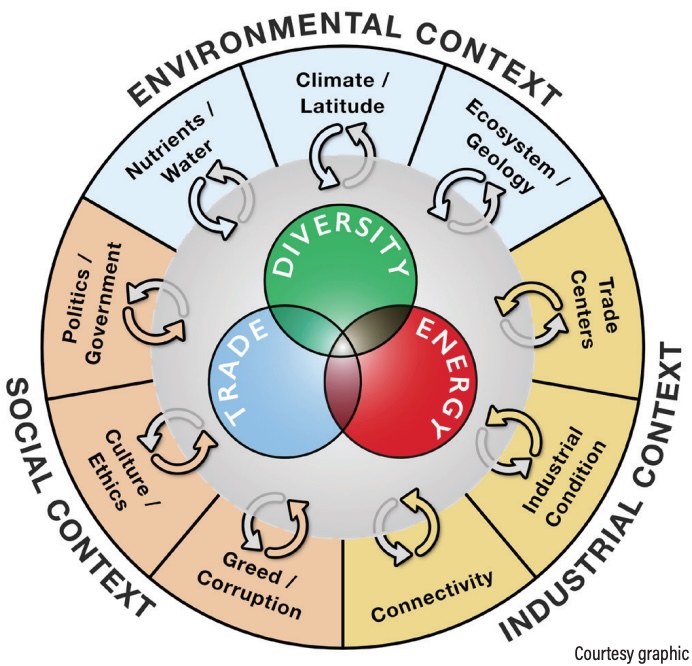Geologically speaking, Colorado is the recent recipient of a makeover. Some 300 million years ago, the Rocky Mountain state was situated near today’s flat Yucatan Peninsula of Mexico. Ever since those pre-human days, life-exterminating events carved and molded Colorado’s natural history while tectonic movements nudged it northward.
Severe global disruptions were continually being unleashed on its ecosystems, including rampant climate change, volatile shifts in oxygen levels and the erosion of the ancestral Rockies. A monstrous asteroid touched down, extinguishing the reign of dinosaurs while driving three of every four plants to extinction. The age of mammals had arrived.
In the face of these cataclysmic events, plus Earth’s run-of-the mill fires, floods and pestilence, Colorado’s ecosystems did not collapse. They stayed their course, maintaining optimal productivity given the environmental context of the day.
Evolutionary pressures gave rise to new species to replace those that could no longer handle the new environmental conditions. Over time, humans ventured into North America, where they were welcomed by a complex and thriving array of ecosystems.
Thanks to the stewardship of our indigenous ancestors, Colorado’s ecosystems maintained high productivity and resilience by the time European settlers charted an economic course across the continent.
Much more recently, I began peeling back the complex layers of ecological and economic systems to examine what, if any, lessons nature provides to shape our sustainable economic future. This led to my book, “Ecosystems as Models for Restoring Our Economies (to a sustainable state), a finalist for the Colorado Book Awards in 2023.
Colorado’s ecosystems did not collapse.
I squeezed this book into a visually striking talk, shared around the world for the past three years. Investigative research along the way is shaping this sustainability story with lessons not only from nature, but from communities from Sri Lanka to Italy, and from Mexico and Ecuador — and, of course, from around the USA.

When we imagine nature’s lessons for sustainable business and economic strategies, concepts such as symbiosis, competition, survival of the fittest and resource-use efficiency come to mind. Those are all valid.
However, three decades of cross-cutting research between ecosystems and economies has revealed deeper lessons, many of which rarely come to mind — if ever.
Foundational concepts could help shape our economies in ways that not only balance social and ecological needs, but build food security, energy sovereignty and heightened resilience in anticipation of the coming century of global turbulence predicted by Alan Greenspan, former Federal Reserve chairman.
Audiences agree, this talk (and the book) changes the way we think about sustainability.
This collaborative event is sponsored by Manitou Pollinators, the Manitou Springs Parks and Recreation Department, Wild Connections, Fountain Creek Watershed Flood Control & Greenway District, Colorado Humanities & Center for the Book, Beth Chorpenning and the Butterfly Pavilion.
As Manitou Springs embarks on a landmark sustainability initiative, it is only logical we look to those systems that have thrived in the face of Earth’s most tumultuous events, building resistance with each passing test.
If you doubt that ecosystems can hold the clues to restoring something as complex and sophisticated as our modern economies, may this talk (and the book) cause you look, look again and question the conventional wisdom.
John Giordanengo is a Colorado author, conservationist and restoration ecologist.
IF YOU GO
The Ecosystems as Models for Building a Sustainable Watershed Economy presentation will start at 6 p.m. Thursday, March 14, in City Hall/Memorial Hall, 606 Manitou Ave. Arrive early to ensure a good seat at this free event. It’s limited to 200 people; please RSVP at tinyurl.com/FacebookGiordanengoEvent.

